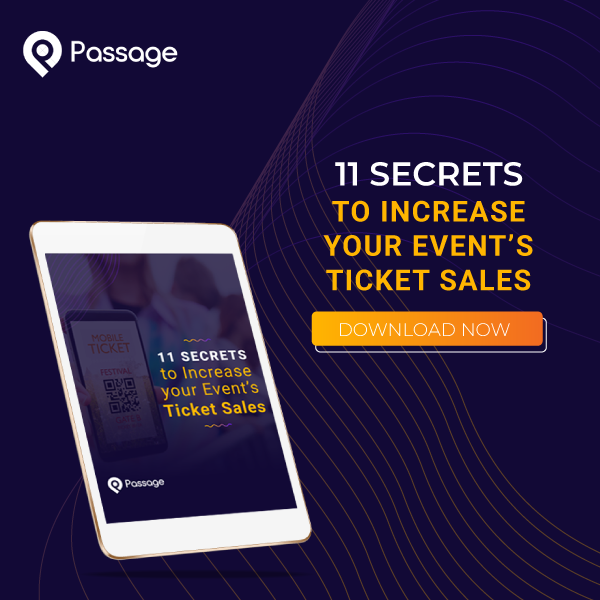
Photo by Krists Luhaers on Unsplash
Canceled musical acts. Rain-soaked mattresses. Refugee camp accommodations. Chaos. Million-dollar lawsuits. And that infamous cheese sandwich.
Unless you’ve been living under a rock the past couple of years, you’ve probably heard all these phrases describing the massive failure that was the 2017 Fyre Festival. While it might be the most famous flop, it’s certainly not alone among the strain of recent festivals where guests were promised one experience and received something much, much different. The Governor’s Ball, Great GoogaMooga, XO Music Festival, Hong Kong’s Full-Moon Party, San Francisco’s Clusterfest, and even Bonaroo have all been compared recently to the Fyre Festival.
Even with the best of intentions, it’s easy to get in over your head organizing a major event, whether that’s a music festival, a food & drink celebration, renaissance fair, or fan convention.
So how can you make sure your event doesn’t turn into a nightmare? Follow our tips below to make sure your first festival is a sweet success.
It’s ok to start small
While you might want to make a huge splash with your first event, your festival will be more likely to survive for a second year if you start out with a reasonable scope and budget. Small events can still be profitable!
More importantly, letting the event grow organically will actually make it better. You’ll learn which parts of the festival your guests are most drawn to, and you can do more of that the following year. Likewise, you can cut out portions that are less popular or profitable.
Don’t try to do everything yourself
As the head honcho, you’ll likely have to wear multiple hats, but that doesn’t mean you have to do this alone. Spreading yourself thin will only leave more cracks which details can fall through.
If you have lots of media contact and your skills are best spent promoting the event, find a partner who can help with the vendors and logistics. On the flip side, if you’re more into the numbers and logistical details but don’t even know where to start on a media strategy, partner with someone who has experience in that area. It doesn’t have to be just one person; successful festival producers build entire teams of employees, volunteers, and trusted vendors who all play an important role.
Take a hard look at your own skillset, acknowledge your strengths and shortcomings. Then, build a team around you to fill in the talent gaps.
Expand your own skillset
If you don’t have a ton of experience, consider volunteering at another festival in your area — even if it’s a totally different vibe. You’ll gain valuable experience in how experienced event handle crowds, tickets, and other essential logistics.
Put on your “organizer” hat when you attend events, too. Take notice of things like your experience at the front gate and waiting in line. How easy was it to find parking? Were there enough restrooms? A place to get out of the sun?
Take inventory of the experiences you like and don’t like, then apply your new knowledge to your own festival.
Don’t forget the essentials
It’s easy to get caught up in the fun aspects of your event like the music lineup or the activities, but the less glamorous elements can make or break your guest experience — or even shut down your event altogether. One of the first things you should do is find out what kind of permits you’ll need from the city, and leave plenty of time for their submission and approval.
Don’t forget about your guests basic needs like bathrooms and trash cans when planning your setup. The same goes for food and water, whether you’re offering those free of charge or for purchase. Consider your needs for amplified sound, electrical hookups, lightning, and stage equipment.
Almost every festival needs some kind of security and first aid, so be sure to research what your location requires and factor that into your planning as well as your budget.
Figure out your revenue strategy
Festivals come with a lot of costs: the land, the permits, the entertainment, the equipment, the staff. Who’s going to pay for all that?
Oh yeah, you are!
You should have a plan for covering up-front event costs (like space, permits, and vendors) in advance because you never know how much revenue your first year will bring. Equally important, you need revenue to recoup those costs and fund next year’s fest. And you’d probably like to secure a nice little payday for yourself for doing all the hard work that comes with organizing a big event.
Most likely, you’ll want to sell tickets for your festival in advance and at the door, to maximize revenue opportunities. There are tons of different ticketing and admission options for an outdoor festival, and finding the right strategy for your event can make all the difference.
First, there’s admission to the festival itself: will you charge for admission, let guests in for free and charge only for food and beverages or special experiences? Will their admission be all-inclusive or a la carte? Or some combination of the two? Will they purchase food, drinks, and merchandise directly from individual vendors, or will there be a central booth that sells tokens or tickets which guests then redeem at the vendor of their choice? Consider whether you’ll need things like wristbands or drink tokens, or whether you can go completely digital using mobile ticket redemptions.
Then, there are upsell opportunities: will you have a VIP option that allows early admission to the food and drink stations, or entry into a reserved section closer to the stage?
If all this sounds a little overwhelming, go back and check out my previous post on Festival Pricing: All-Inclusive or A La Carte.
This is the one time in this post that I’ll make a short plug for our team at Passage: we’re experts in event ticketing strategies, revenue strategies, and helping you get more guests through the door. If you need help figuring out any of that, we’d love to chat.
Consider selling sponsorships
You don’t have to rely entirely on ticket sales to make money on your event. Consider selling advertising packages to local businesses or even national corporate sponsors.
This will help you cover your costs and will offer them positive exposure in the community.
There are a number of things you can include in a sponsorship package like banners with supporters’ names or logos, emails sent to attendees before or after the event, or printing their name and message on every ticket you sell. You could even give guests coupons to use at local shops or restaurants, so they can get some additional business, too!
As your event grows, so will the exposure a sponsorship package brings. As attendance increases, you can increase the cost of sponsorship or introduce higher-dollar advertising packages.
Don’t be afraid to think outside the box and get creative with your sponsorship options. Some businesses might be looking for ways they can sponsor guests experiences or opportunities for their team to interact directly with your guests. Maybe they could sponsor food and drink tent with free snacks and infused water, or a lounge where guests can get out of the sun and charge their phones at the same time. If a sponsor is willing to cover the cost, you can upgrade your guest experience while boosting revenue.
Follow up
Don’t make the mistake of thinking your event ends when the last guest leaves the venue. Great event producers see the end of their festival as a beginning: a time to debrief, to evaluate what went well, what didn’t go so great, and what they should do moving forward.
Send surveys to guests a day or two following your festival and ask them about their experience: What did they like most? What would they like to see next year? Did they feel like they got a good value for the ticket price? What would they change or improve? If you’ve captured their email addresses in advance (which you should; we can help with that), it will be easy to deliver a survey right to their inbox.
Gathering guest feedback will not only clue you into how well you did, it can be a wellspring of ideas that you might never have thought of on your own.
Listen to their insights and seriously consider the ones that make sense to incorporate into next year’s festival.
Feel free to use the comments section below to share your best festival tips or ask questions about starting your own event! Thanks for reading 🙂











